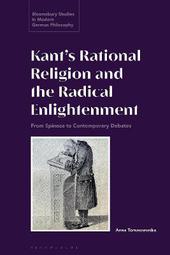
|
Kant's Rational Religion and the Radical Enlightenment: From Spinoza to Contemporary Debates
Hardback
Main Details
Description
Kant's defence of religion and attempts to reconcile faith with reason position him as a moderate Enlightenment thinker in existing scholarship. Challenging this view and reconceptualising Kant's religion along rationalist lines, Anna Tomaszewska sheds light on its affinities with the ideas of the radical Enlightenment, originating in the work of Baruch Spinoza and understood as a critique of divine revelation. Distinguishing the epistemological, ethical and political aspects of such a critique, Tomaszewska shows how Kant's defence of religion consists of rationalizing its core tenets and establishing morality as the essence of religious faith. She aligns him with other early modern rationalists and German Spinozists and reveals the significance for contemporary political philosophy. Providing reasons for prioritizing freedom of thought, and hence religious criticism, over an unqualified freedom of belief, Kant's theology approximates the secularising tendency of the radical Enlightenment. Here is an understanding of how the shift towards a secular outlook in Western culture was shaped by attempts to rationalize rather than uproot Christianity.
Author Biography
Anna Tomaszewska is Assistant Professor in the Department of History of Philosophy at the Institute of Philosophy, Jagiellonian University, Poland.
ReviewsAnna Tomaszewska's book offers an accurate, original, compelling reassessment of Kant's thinking about religion, against the background of the radical Enlightenment and its impact on Kant's mind. This masterly account, which has mastered Kant in many ways, provides fresh food for thought on the relationship between the Enlightenment and religion. * Diego Lucci, Professor of Philosophy and History, American University in Bulgaria, Bulgaria * By examining Kant's religious thought through the lens of recent debates about the Enlightenment, Tomaszewska offers valuable insight into the relationship between divine transcendence and human autonomy. Impressively grounded in the sources, the work challenges current views concerning Kant's religious thought and, more broadly, concerning the very idea of secularization. * Gordon E. Michalson, Jr., Professor Emeritus of Humanities, New College of Florida, USA * This book offers a valiant attempt to synthesize traditional interpretations of Kant's theory of religion, as radically reductionist, and recent readings emphasizing his moderate, affirmative tendencies. Skillfully balancing various divergent interpretations of Enlightenment approaches to religion, Tomaszewska judiciously assesses how Kant's position relates to those of his forerunners, especially Spinoza. * Stephen R. Palmquist, Independent Scholar (D.Phil., Oxford University), UK *
|